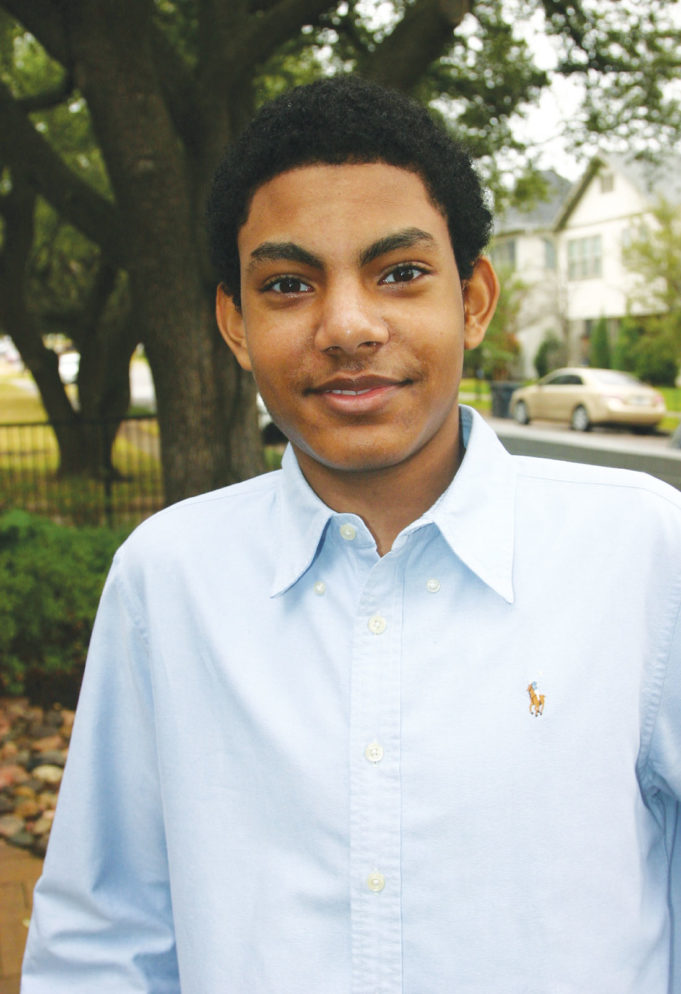Some kids start taking college courses while still in high school. Others begin sooner, such as Arlington resident Khaleel Plunkett, who signed up for online college courses at age 12 while being home-schooled by his mother, Jennifer Plunkett.
In 2018, Khaleel took online courses at the University of Texas of the Permian Basin and at Weatherford College before deciding to enroll in residence classes at Tarrant County College’s Southeast Campus.
“When you take an online course, if you read it and don’t understand, you can’t really ask any questions,” he said. “You have to kind of figure it out yourself. But in residence courses, if you have a question, you ask your teachers, and they answer.”
Jennifer takes classes at TCC as well, and the Plunkett home is close to the campus, so she figured it would be an easy transition for Khaleel. Instead, he has encountered employees who seem more interested in tossing obstacles into his path rather than encouraging him, Jennifer said.
“It’s one thing after another,” she said. “He can’t even enjoy being a student and going to class because he’s having to deal with issues that should not be issues. It’s not fair to him.”
The first issue occurred almost immediately after he started attending classes in May. Khaleel had signed up for some daunting courses and needed an easy elective to offset the load. The best one available at a time that fit his schedule was a human sexuality class.
Khaleel was nervous that first day.
“Being in a room with adults talking about sexuality, I thought that might be weird for them because I’m there,” he said.
He decided to withhold his age from his classmates so they wouldn’t feel self-conscious about discussing sexuality in front of him. Khaleel is tall and appears older than his age. Fewer than 10 people were enrolled in the class, and all were women ranging in ages between 20 and 40, Khaleel said.
“It wasn’t awkward,” he said. “They could tell I was young, but they probably thought I was 20 or something.”
Khaleel described his teacher as “one of the nicest people I ever met.”
A week later, however, Khaleel received an email from an administrator saying he would be dropped from the class.
“They said I was too young,” Khaleel said.
He wasn’t allowed to transfer to another elective class, he said, leaving a hole in his schedule. The Plunketts looked up a school policy that forbids discrimination against students on account of age. Khaleel and his mom visited the school’s then-vice president of academic affairs, Dana Grove, who agreed that school policy prohibited age discrimination.
Khaleel returned to human sexuality class.
Other than that flap, Khaleel was enjoying his first time on a college campus, where he made solid grades and earned a place on the Dean’s List.
“It’s a good environment,” Khaleel said. “Nice people. Good classes.”
He didn’t meet any other 13-year-olds on campus, although he did meet a 16-year-old student.
“There’s no one my age,” Khaleel said.
With the human sexuality controversy ended, Khaleel was focused again on his studies, when he told his teachers he would miss a few school days because of religious holidays. He and his mother celebrate the holy days outlined in Leviticus 23. Khaleel offered to make up any assignments or tests missed while he was observing the holidays. All of his teachers agreed except for one, who said Khaleel would earn a zero on a test he would miss.
Once again, the Plunketts referred to school policy, which said students “shall be excused from attending classes or other required activities, including exams, during time needed for travel for the purpose of the observance of a religious holy day.”
The Plunketts showed the teacher the policy, but “he wouldn’t go for it,” Khaleel said.
They showed the policy to the teacher’s supervisor.
“She said the teacher can do whatever he wants,” Khaleel said.
Only another trip to the vice president’s office cleared up the matter.
The weeks went by, and Khaleel continued making solid grades. He earned enough credits to receive his associate’s degree before his 14th birthday.
Or so he thought.
The college supplied a transcript that showed Khaleel was one credit short of the 60 credits needed. The Plunketts pored over the document and discovered that a clerical error had created the problem. They went to the college administrative offices to point out the error and provide proof of his credits but were shunned, Khaleel said.
“For whatever reason, they would not switch” the erroneous transcript, he said. “I was angry. I worked so hard over the year … and you won’t give me a degree because you put the wrong thing in the wrong place, and then you won’t fix it?”
After receiving the runaround for a month, Jennifer and Khaleel came to the Fort Worth Weekly to share their difficulties.
On March 4, I called the school and was told to email my questions to communications director Suzanne Groves. I sent a lengthy letter describing the Plunketts’ concerns and asked to speak to an administrator. I included a list of questions I wanted to discuss.
That same day, Groves responded with a one-sentence reply: “In response to your inquiries, FERPA regulations prohibit us from disclosing information about FERPA-protected students.”
The Family Educational Rights and Privacy Act of 1974 (FERPA) protects the privacy of student records. I wrote back, saying I wasn’t asking for records and would like to discuss the school’s policies and enforcement.
No reply.
On March 5, I wrote an email describing the three situations explained to me by the Plunketts and sent it to several of the school’s top administrators, including the chancellor.
The next day, a school administrator contacted not me but Jennifer and asked her and Khaleel to meet with an interim vice president. (Grove, who had assisted the Plunketts before, had retired by then).
On March 8, Jennifer called me to describe what happened at the meeting. The interim VP assured the Plunketts that the clerical error had been corrected and that Khaleel would receive his associate’s degree. Also, the VP said the school was holding a meeting with all Southeast Campus staff to discuss the importance of knowing and following policies, Jennifer said.
“She said she would make sure that she herself talks to them about the importance of knowing the policies and specifically anything that deals with age discrimination and religious observance –– things that Khaleel had issues with,” Jennifer said. “That was pleasing.”
Jennifer and Khaleel doubted any of those things would have occurred without the Weekly’s involvement.
The chancellor and other administrators never responded to my emails.
Khaleel enjoys math and science and plans on becoming a doctor.












